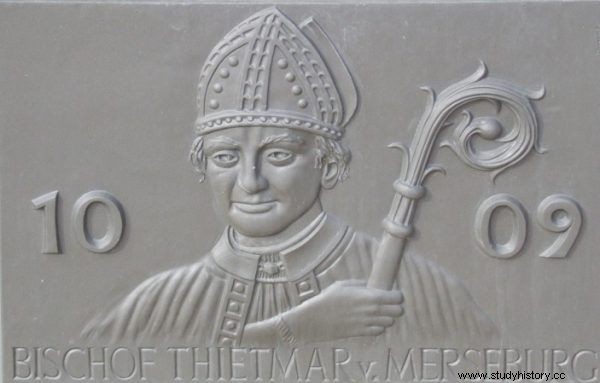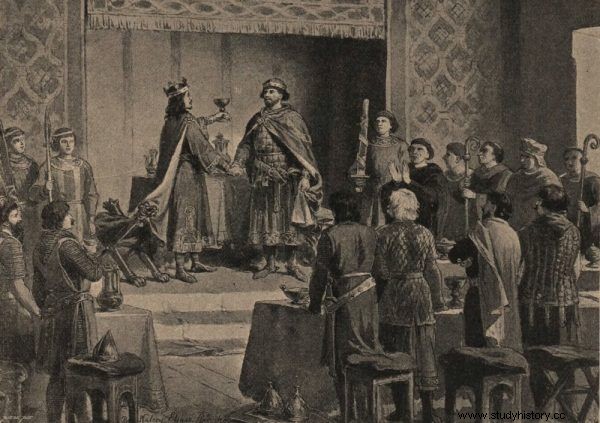If it weren't for Gall Anonim, Wincenty Kadłubek and the authors of the first court year, we would not know almost anything for sure about the beginnings of Poland. It's good that we have at least that much. But do we really have?
Most of the information about the birth of the Piast state cannot be confirmed in any way. Only Gall Anonymous named the first four members of the family. Only the oldest annalist recorded the key dates:Dobrawa's arrival in Poland, Mieszko's baptism, and Bolesław the Brave's birth.
We take this information on faith, and the content of the chronicles is treated by historians with an almost religious anointing. Medievalists devote their entire scientific work to single sentences and words by Gall. It was as if finding out exactly what this or that historian wanted to say was enough to know the truth about the events from before a thousand years. It is not like that at all.
Mistakes, mistakes everywhere
The origins of Poland are also dealt with in German texts:the chronicles of monk Widukind and bishop Thietmar. Both of these books are regarded as extremely reliable sources, and their authors:as truthful and scrupulous people. However, careful reading of them should be a cold shower for Polish scientists. Because the truth is that both Widukind and Thietmar made mistakes. Hundreds of compromising mistakes.

Although Thietmar's chronicle is considered an excellent source of knowledge about the beginnings of Poland, it is actually full of errors (photo Harald Rossa; lic. CC BY-SA 3.0).
Widukind dedicated his Dzieje saskie daughter of Emperor Otto I the Great, Matilda. He knew not only her, but also the ruler himself. He lived and worked in his time and had excellent contacts at his court. It was his task to write down the fate of Otto's family and his ancestors. Even so, he made mistakes even in elementary matters.
He confused the name of the emperor's first father-in-law (he made Edmund out of Edward) and the first husband of his second wife (he renamed Lothara to Louis). Bishop Thietmar who formed forty years later was equally inattentive. He also wrote down the history of Saxony for a good matter, emphasizing the achievements of the ruling dynasty. And he was wrong at every turn.
In telling about the rebellion instigated by Otto's older brother Thankmar, he confused his mother. He said it was Ludgarda, not Hateburga. Elsewhere in the chronicle, he discredited himself even more. For a change, he stated that Thankmar was not Otto's brother, but ... his birth son! There were many more fat mishaps. The date of the death of King Konrad I was postponed by the chronicler by two months. Date of the imperial coronation of Otto the Great:about a whole year in one place and three years in another.
Also in the case of Henry II - the ruler at whose court he served! - He visibly shook something. In stating the king's age, he was mistaken for a whole five years. He made a thirty-five-year-old out of a forty-year-old. He also mistook, for a whole year, the date of the death of one of his colleagues, Bernard, the bishop of Verden. This error sounds less significant, but it must be added that Bernard died while Thietmar was working on his chronicle. It cannot be explained that the historian forgot something. The error was due to sheer carelessness and not a distance in time.
It was not any better with us
Virtually each of these mistakes - and they could be enumerated almost endlessly - concern matters on which Thietmar and Widukind should have the best information. With regard to Polish history, in similar cases, scientists judge that Gall Anonymous or the court annals must have told the truth. After all, they were close to the events, they knew the heroes, they were controlled by the ruler's entourage. In a word:if they were not truthful, who?
The examples of Thietmar and Widukind make similar judgments restrained, especially as it is easy to enumerate dozens of confirmed errors and omissions by Polish historians. Gall Anonymous was able to confuse the affinities and age of people who lived only a few dozen years ahead. He made the guest of the Gniezno congress not Otto III, but his father - Otto II.

Writing about the Gniezno Congress, Gall Anonim confused Emperor Otto III with his father, who had died for several years (source:public domain).
He called the Queen of Riches the Emperor's sister, while she was only his niece. He described Kazimierz the Restorer as an incapable kid, although he was eighteen at the time of his father's death. And this was the grandfather of the protagonist of the chronicle and his patron! In a word, error on error. If we know something for certain, it is only that we must approach the history of the early Middle Ages with obsessive humility. Dates, names, events ... In fact, no facts can be guaranteed in this era.
Bibliography:
The article was based on materials collected by the author during the work on the book "Damy z skazą. The women who crowned Poland " .
